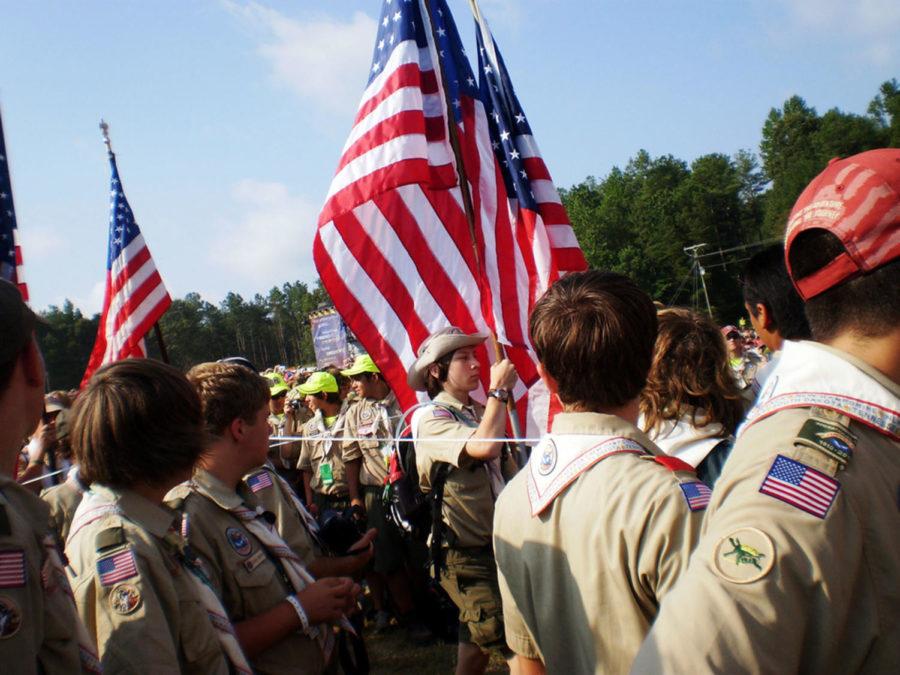Gross: Boy Scouts of America catches up with the times
As representatives and role models for our country’s youth, the Boy Scouts of America have a heavy influence on the actions and attitudes of other children. If the Boy Scouts allow prejudicial practices to be the core of their beliefs, other children could see and follow that example.
February 4, 2013
A big piece of news has been in the social issues arena recently: The Boy Scouts of America is considering ending its national ban on admitting gay members to the organization. This is a new and surprising update, considering the Boy Scouts of America publicly reaffirmed their policy against gay members less than a year ago in July 2012.
This statement forced the issue into the public’s view; previously, few people had known about the ban. The story of Ryan Andresen, a member who was denied Eagle Scout status on account of the fact that he had recently come out, struck chords with a sympathetic society. In an increasingly progressive United States, the Boy Scouts of America’s archaic views did not sit well.
It seems the organization is considering repealing the ban at last. The new policy they might institute leaves the issue up to local chapters. On the national level, they will no longer bar gay individuals from involvement, but specific troops may choose to deny gay scouts and leaders. Even though it hasn’t officially been revoked yet, the potential policy change has gay rights activists celebrating all over. No matter how small or inconsequential it seems, it is a step in the right direction.
Though the act itself is good, the organization’s motivation for this change seems questionable. It is hard to believe the Boy Scouts of America does this out of the goodness of its heart, especially considering how recently the group had declared itself against gay admittance. For the organization to continue to be relevant, it had to change some of its out-dated opinions. Some of the group’s sponsors retracted their funding when Boy Scouts of America remained obstinate last year.
When money starting slipping through the Boy Scouts’s fingers, they realized they desperately needed a policy revision. It is no coincidence that more liberal organizations have more stable funding. The Girl Scouts of America, which has had a neutral policy on sexuality for more than two decades, stays safely afloat on its generous sponsorships and supporters. Perhaps the Boy Scouts decided they needed to take a leaf from their sister organization’s book.
Despite its dubious motivation, the Boy Scouts of America are definitely helping both their image and their treasury with this small step. But that is exactly what it is: a small step. It has taken far too long for the organization to make even this change. It is 2013, a socially liberal era, and though many are still disgruntled about gay marriage in the United States, most major associations have done what they can to include gay men and women.
Keep in mind that the repeal of the ban will not necessarily be all-inclusive. If enough local chapters decide to keep out potential gay scouts or leaders, it will be as if nothing has changed. National public outrage has forced change on the national level. What is needed now is local-area support of gay members, to ensure that small chapters abandon their prejudices as well.
Why is it so important that the Boy Scouts of America forsakes its discriminatory ways? There are plenty of other organizations that have similar or worse prejudices. However, few groups are thought to represent America’s youth as the Boy Scouts of America does.
The organization has been around for more than a century, having been founded in 1901. For the majority of that time, it has represented the values that we want to instill in children: charity, hard work, acceptance and self-reliance. These traits are meant to help the youth grow into the American ideal of kind, successful men. How can we trust the Boy Scouts of America to do this when it so stubbornly clings to old bigotries? Even boys who are not members of the Boy Scouts of America are influenced by the ideals they portray. By accepting the organization’s policies against gay members, we allow them to spread their prejudice to a new generation.
If the Boy Scouts of America wants to continue to represent the finest qualities in youth and leadership, it needs to accept that in today’s society, every child deserves equal treatment. Now that the Boy Scouts of America is considering removing the ban against gay members, it seems the organization has finally realized that. With continued social action, small steps like this will eventually become large, and the Boy Scouts of America will become what it previously was: an exemplary tradition for educating boys and young men.
——————————————————————————————-
Hailey Gross is a sophomore in English from Cedar Rapids, Iowa.







